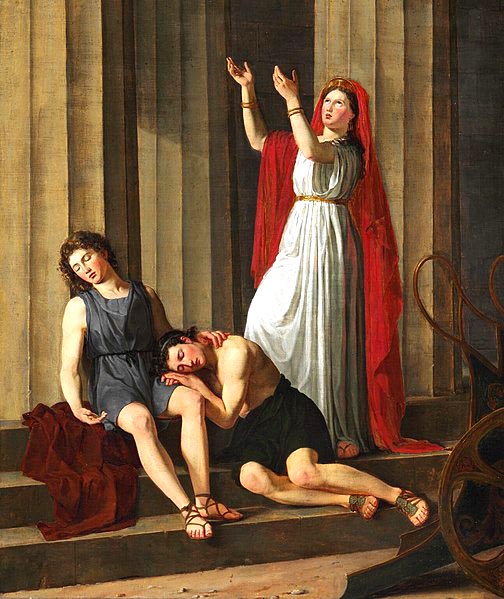 |
| Kleobis and Biton sleep as Cydippe prays to Hera (Wikipedia) |
Note: One of the earliest major works of history is the book that gave us the word: The Histories, by Herodotus (who is called, naturally enough, the "Father of History"). It's filled with, not just solid history, but local legends, folk tales, and plenty of wisdom. Here's a taste.
Get Ready: How would you describe a "happy life"?
The Athenian statesman Solon (630-560 BCE) was known as the wisest of all the Greeks. Croesus, King of Lydia (born 595 BCE; death unknown) was so rich that even today, "as rich as (or richer than) Croesus" is a common expression. History says they never met, but The Histories, by Herodotus, tells the legend of a most interesting interview between the two.
Croesus exhibited the attitude that the Greeks called hubris, excessive pride or self-confidence. Meaning to brag (as he expected the answer to be himself!), Croesus supposedly asked the wise Solon, "Who is the happiest man in the world?"
He was disappointed by Solon's first answer. He named the otherwise-unknown (to us) Tellus, another Athenian statesman, who had wonderful children and grandchildren. He died gloriously in battle, and was buried with honors.
So Croesus asked again: "Who, then, is the next happiest?" hoping that he would at least come in second.
And Solon told the king the story of two Argive brothers, Kleobis and Biton.
Their mother, Cydippe, was a priestess at the temple of Hera, wife of Zeus. One day, she was supposed to attend an important festival in town, but the oxen who pulled her cart could not be found. So the brothers yoked themselves to the ox-cart and pulled her the six miles to the temple. Exhausted, they then fell asleep under a tree on the temple grounds.
As they slept, the people of Argos were praising the brothers for their filial piety and their devotion to the gods, while, in the temple, their mother thanked Hera for them, and prayed that they would be rewarded for both their strength and their faithfulness. Hera fulfilled the mother's prayer: the two brothers died in their sleep that very day, at the zenith of their reputation and in full health. The Argives built statues of them in the temple of Apollo at Delphi.
"What?" cried Croesus as Solon ended his story. "How could they have been happier than I?"
"Because," the wise man answered, "they are dead, and died happy, and no misfortune can touch them any longer. You, your majesty, cannot be sure you will always be as happy as you are today!"
Sure enough: Croesus' son was killed accidentally, his wife later committed suicide, and he was enslaved when his kingdom fell to the Persians. Money truly can't buy happiness.
--------- Read more: https://en.wikipedia.org/wiki/Kleobis_and_Biton
- Read "Kleobis and Biton" FREE online (scroll down to the middle of Chapter II)
Practice: Match the term to its definition below:
- brag
- enslaved
- excessive
- filial piety
- gloriously
- oxen
- statesman
- suicide
- yoked
- zenith
- honor to one's parents
- politician
- death by one's own hand
- highest point
- kind of cow used to pull wagons
- boast
- tied together
- too much
- with great honor
- held in bondage
Answers are in the first comment below.
Submitted to the Shenzhen Daily for January 4, 2021


Answers to the Practice: 1. f; 2. j; 3. h; 4. a; 5. i; 6. e; 7. b; 8. c; 9. g; 10. d
ReplyDelete